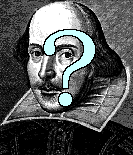What's so special about Shakespeare?
Here's one query I received by email:
I would just like to know why people are still talking about the guy? Is it because he was a genius and the only way they could justify his plays and poetry is looking for faults in his character? First the guy is gay, then he never even wrote the plays. just recently I read a newspaper article that "suggested" he smoked pot and did coke. So why are people still talking about him today?
It's a fascinating question. Perhaps there is more than one answer.
People still talk about Shakespeare and study his plays because
- he wrote plays that are enormously rewarding to act and direct
- his characters are endlessly interesting and impossible to reduce to a simple formula
- his language, though now difficult, is subtle, richly varied, and eloquent (this includes the Sonnets, of course)
- the plots of his plays still speak to the experiences of a modern world (think of the recent teen movies Ten Things I Hate About You from The Taming of the Shrew and Get Over It from A Midsummer Night's Dream)
- his plays survive translation, and are performed around the world
- he's just an amazingly good writer.
There are also some less attractive reasons. Some people still talk about Shakespeare because:
- he's famous, so you should take him seriously
- he's famous, so you would look bad if you didn't say you liked him
- he's always been studied, so we should go on studying him.
Why do some people claim he didn't write the plays?
Some people find it hard to believe that the son of a middle-class glover, with just a regular school education, could have written such passionate and intellectual plays. This is really pretty silly. Alfred Hitchcock, director and creator of some of the classic films of the twentieth century, left school at the end of grade seven. Most of the major writers before and after Shakespeare had regular schooling without going to a university -- but, like Shakespeare, they went on reading and learning all their lives. It's always entertaining to believe in conspiracies, and there has been a great deal written about the people who are supposed to have written the plays rather than Shakespeare: Edward de Vere, Earl of Oxford is a popular candidate these days, but Francis Bacon and Christopher Marlowe have also been suggested (too bad that two of them died before many of the plays were written). There's a section on this whole discussion on the site.
Shakespeare's sex life and his remarkable imagination
We don't know what Shakespeare's sex life was like (there was no National Enquirer in those days), so it's fun to speculate. Your can go to a discussion of the Sonnets and the fact that he wrote most of them to a young man rather than a woman.
One odd suggestion is that you can't have an imagination unless you smoke something -- some years ago two scientists in South Africa speculated that Shakespeare may have had some help from artificial sources to enhance his creativity. They have analyzed the residue in some pipes that were found in one of the houses Shakespeare lived in, and found what might have been cocaine and some other herbs. That's pretty silly too: children have amazing imaginations when they are small, and they don't have to smoke anything. Tobacco had been introduced into England in Shakespeare's lifetime, but there is no evidence that there was a deliberate use of any herbs for hallucinogenic purposes in the period. There was plenty of good (and not so good) wine and beer, however.
